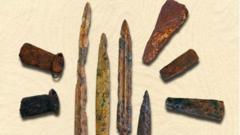For over two decades, archaeologists in Tamil Nadu, India, have embarked on a journey of discovery, uncovering a treasure trove of artifacts that redefine ancient narratives. These recent excavations have revealed iron objects at multiple sites, dating as far back as 3,345 BCE, suggesting an independent emergence of iron production in the region. Such findings challenge the established historical perception that the Iron Age began primarily in present-day Turkey.
Prominent sites from this exploration, including Adichchanallur, Sivagalai, and Mayiladumparai, have uncovered a wealth of iron tools, ranging from knives and spearheads to advanced weaponry. Modern studies indicate that these iron artifacts date back 5,000 to 5,400 years, implying a sophisticated understanding of metallurgy in ancient Tamil Nadu. Prof. Dilip Kumar Chakrabarti from Cambridge University underscores the critical nature of these findings, indicating that their full implications require deeper exploration.
However, calls for caution accompany these discoveries. Parth R. Chauhan from the Indian Institute of Science Education and Research stresses the need for additional research to validate these findings and suggests that ironworking might have evolved independently in various global regions. Meanwhile, Oishi Roy from the Indian Institute of Technology argues that these developments indicate parallel technological advancements in iron production throughout different parts of the world.
Significantly, the Tamil Nadu sites provide insights into iron-making techniques, including smelting iron from ore - a process critical in shaping early tools. Excavation of a furnace at Kodumanal demonstrates that the ancient inhabitants were not just users of iron but actively engaged in its production. The techniques they employed, including high-temperature processing, reveal a progressive community with advanced metalworking skills.
Despite such significant findings, experts acknowledge that India still has a wealth of untapped archaeological potential. Numerous sites across the country await exploration, and the challenge lies in comprehensively understanding the origins and spread of iron technology.
The implications of the Tamil Nadu discoveries could reshape global perceptions of the Iron Age, marking it not as a singular event confined to one region, but as a technological evolution shared by diverse cultures. As archaeologist Katragadda Paddayya suggests, further research is essential to construct a complete picture of iron's historical journey in the Indian subcontinent.


















